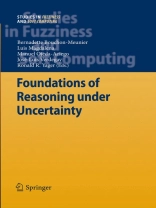Uncertainty exists almost everywhere, except in the most idealized situations; it is not only an inevitable and ubiquitous phenomenon, but also a fundamental sci- ti?c principle. Furthermore, uncertainty is an attribute of information and, usually, decision-relevant information is uncertain and/or imprecise, therefore the abilities to handle uncertain information and to reason from incomplete knowledge are c- cial features of intelligent behaviour in complex and dynamic environments. By carefully exploiting our tolerance for imprecision and approximation we can often achieve tractability, robustness, and better descriptions of reality than traditional – ductive methods would allow us to obtain. In conclusion, as we move further into the ageofmachineintelligence, theproblemofreasoningunderuncertainty, in other words, drawing conclusions from partial knowledge, has become a major research theme. Not surprisingly, the rigoroustreatment of uncertaintyrequiressophisticated – chinery, and the present volume is conceived as a contribution to a better und- standing of the foundations of information processing and decision-making in an environment of uncertainty, imprecision and partiality of truth. This volume draws on papers presented at the 2008 Conference on Information Processing and Management of Uncertainty (IPMU), held in Malaga, ´ Spain, or- nized by the University of Mal ´ aga. The conference brought together some of the world’s leading experts in the study of uncertainty.
Innehållsförteckning
Linear Fuzzy Regression Using Trapezoidal Fuzzy Intervals.- Fundamentals for Design and Construction of a Fuzzy Random Forest.- Mining Exception Rules.- Degrees of Truth, Ill-Known Sets and Contradiction.- Algorithms for Trapezoidal Approximations of Fuzzy Numbers Preserving the Expected Interval.- Possibilistic Similarity Measures.- Efficient Thresholded Tabulation for Fuzzy Query Answering.- Linguistic Summaries of Time Series: On Some Additional Data Independent Quality Criteria.- Preference Modelling Using the Level-Dependent Choquet Integral with Respect to ?ukasiewicz Filters.- Majority Rules Generated by Mixture Operators.- Belief Function Correction Mechanisms.- A Comparison of Conditional Coherence Concepts for Finite Spaces.- On Evidential Markov Chains.












